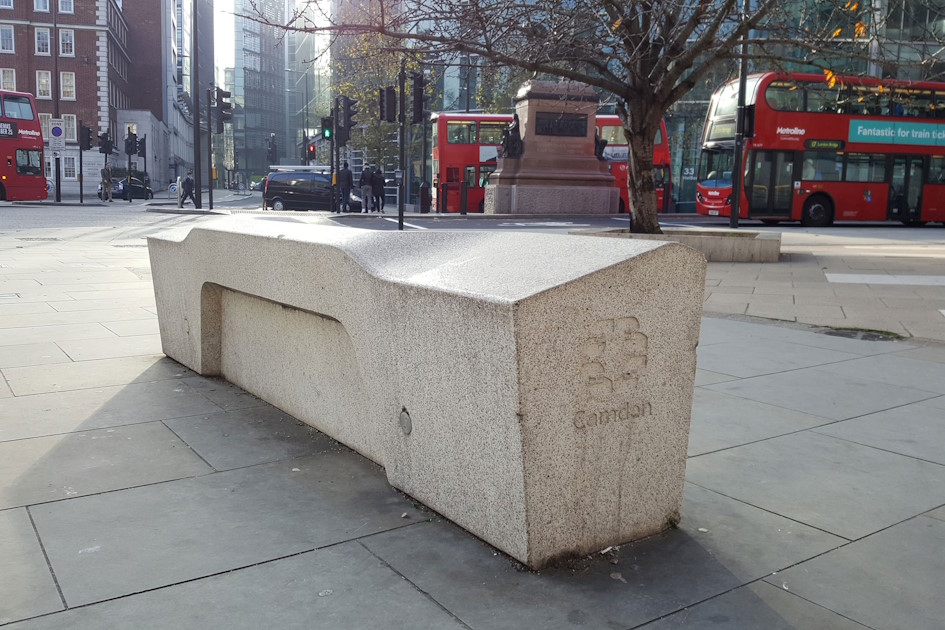❧ For communities to thrive and connections to form, people need to be able to meet in cheap, low-ish trust settings. Unfortunately, many public spaces are hostile to gathering. Benches are rare and broken up with armrests or bizarre architecture to prevent sleeping or skateboarding. The pinnacle example is the Camden Bench, an “amorphous slab of concrete made from a material that resist posters, stickers and graffiti, it has a ridged peak and sloped surface that prevents sleeping, and its makers even claim the bench deters litterers and drug dealers by not providing any crevices to shove things. Comfort is not one of its top features though – you have to perch on a sloped seat and there’s no backrest.”1 Being “defined far more by what it is not than what it is”, the bench has been called the “perfect anti-object.”2

Seating appropriate for socialising are often highly concentrated to businesses. “London Heathrow’s Terminal 5 has just 700 seats for the estimated 35 million travellers a year passing through its gates. For most of these weary globetrotters, the only place to sit down is in one of the 25 airport restaurants.”1 When they aren’t, they often aren’t suitable for groups. In my hometown there’s a beautiful grassy park with plenty of benches, but they’re all individually placed far from each other - there isn’t a single public group sitting area in the entire town.
Anecdotally, bins seem to have gotten rarer over the last decade too, emphasising public spaces as places only for passing quickly through.
I think the best way to improve this is to engage with local councils. I actually found out the government are thinking about funding council to install chess tables in public spaces, which could be an interesting idea. But also, we might be held back a bit by our culture in the UK. In Denmark, for example, it’s fairly common to play dice and card games at bars, but we don’t have a culture of social games or anything that might help us share spaces with each other.
❧ I think there’s a greater desire to have community members align on political issues, even in unpolitical spaces. There’s nothing wrong with any given community being political, but there’s the wider sense that it’s wrong to ban politics or controversial subjects because they are fundamental and they widely affect people’s lives.
I can understand this, but in reality, I think people highly impacted by politics get tired and appreciate places where these topics don’t come up. It’s volatile and polarising to have people essentially announce their political affiliations as they walk in the door. One of the most stable communities I’m in has an extremely strong norm against controversial subjects, and it works very well.
❧ Community has been industrialised. There are now such things as “official communities” for video games; game publishers care a lot about maintaining them, hiring “community managers” to moderate their spaces. Even when not official, it’s not uncommon to hear of “the community” for identities, fandoms, and otherwise. Mostly, it’s meaningless—only a tiny fraction of the group will engage in a community for it. Every city is a city, but they have wildly different cultures; no one would claim to represent “the urban community”.
Sub-communities have different cultures, even when they don’t intend to. So, we should start communities, even if they don’t seem special or different from existing ones!
Update: Discord is trialling a feature called Guilds, which are special, invite-only groups capped at 200 people. You can create a badge that members can show publicly on their profile, which also serves as a way for other people to apply to join. I really hope it’s successful; I’ve never seen a social platform encourage small, diverse communities so directly.
❧ At least in the UK, housing prices per square meter have risen quite a lot vs wages, giving people less space on average to host parties and groups.
I think this makes it really important to find and support community spaces like cafés, halls, places of worship, etc.
❧ Finally, I think there are various ideas in the water that make connection hard. Some people treat relationships extremely contractually, spending time debating blame in other peoples’ disputes (AITA?), rules-lawyering about complex boundaries, power dynamics, etc. Or they downplay the impact of connection, advocating a high level of individualism and “love yourself first.” Are we afraid to admit that being lonely just kind of sucks?
